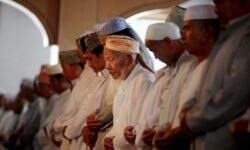More than a million Chinese Muslim Communist are being moved to live with local families in the western region of Xinjiang, a move seen as a sign of the government’s increasingly tightened grip over the area’s predominantly Uyghur Muslim population.
The so-called “home stays,” announced by the government, target farmer households in southern Xinjiang, where the authorities have been waging an unrelenting campaign against what they call the forces of “terrorism, separatism and religious extremism.”
The clampdown is part of a push to “Sinicise religion” – a policy introduced by President Xi Jinping in 2015 to bring religions into line with Chinese culture and the absolute authority and control for the ruling communist party.
Government statements and state media reports show that families are required to provide detailed information during the visits on their personal lives and political views. They are also subject to “political education” from the live-in officials– whose stays are mandated to be at least one week per month in some locations.
International advocacy group Human Rights Watch highlighted and condemned the government’s “home stay” program in a report released Sunday, calling it a serious violation of privacy and cultural rights of the 11 million ethnic minorities in Xinjiang.
It’s the ultimate form of surveillance, it’s a forced political indoctrination and assimilation program.
Tensions have remained high in Xinjiang — a resource-rich area long inhabited by the Turkic-speaking ethnic Uyghurs and other Muslims. Following a spate of violent attacks in recent years. The Chinese authorities have blamed the incidents on Muslim Uyghur separatists seeking to establish an independent state.
Calls to prayer are now banned in Yinchuan on the grounds of noise pollution – Nanguan has replaced its melodious call with a piercing alarm. Books on Islam and copies of the Quran have been taken off the shelves in souvenir shops. Some mosques have meanwhile been ordered to cancel public Arabic classes and a number of private Arabic schools have been told to shut down, either temporarily for “rectification” or for good.
In numerous photos posted online, the authorities paint a picture of ethnic unity, showing smiling Han officials and minority families jointly preparing meals, doing household chores, playing sports and even sharing the same bed — images that Human Rights Watch’s Wang says put the “forced intimacy” element of the program on full display.
China considers separatist movements in the area as a threat to the stability of the country, and officials usually avoid commenting on the issue any further.
Government statements have stressed the program’s effectiveness in resolving people’s daily and social problems such as trash collection to alcoholism.
[simple-payment id=”7912″]






